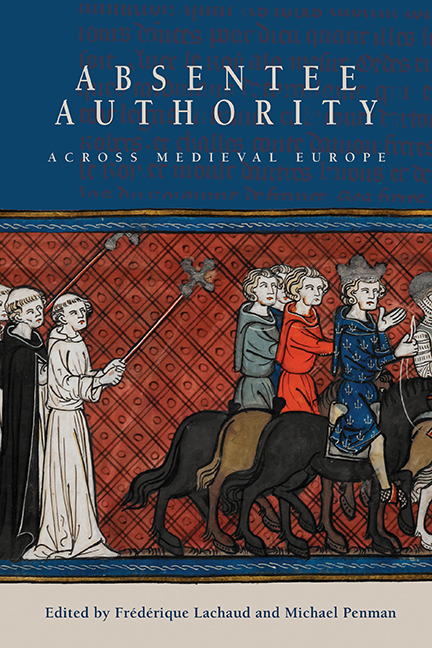Book contents
- Frontmatter
- Contents
- List of Illustrations
- List of Contributors
- Acknowledgements
- List of Abbreviations
- Introduction: Absentee Authority across Medieval Europe
- 1 Incarnating Authority, Exercising Authority: The Figure of the King in the Merovingian Era
- 2 ‘Ubi armae ibi princeps’: Medieval Emblematics as the Real Presence of the Prince
- 3 While the Bishop's Away …: Absentee Bishops of Parma during the Investiture Contest
- 4 An Inconceivable Absence: Usurpers and Illegitimate Rulers in the Genealogical Rolls of the Kings of England, from the Late Thirteenth to the Early Fifteenth Centuries
- 5 Local Loyalty and Absentee Authority in Thirteenth-Century Normandy: The Evidence of the Querimoniae Normannorum (1247)
- 6 Representation and Authority in Thirteenth-Century England and Gascony
- 7 Internal Exiles: Exclusion from the Fourteenth-Century English Court and Kingdom
- 8 ‘Si grant charté a Paris … par defaulté du roy’: Governmental Practice and the Customary Geography of the Absence and Presence of the King in France (1364–1525)
- 9 Was the Couple a Palliative to the Absence of the Prince? The Political Role and Influence of Margaret of Flanders during the Reign of Philip the Bold, Duke and Count of Burgundy (1384–1404)
- 10 Guardian – Lieutenant – Governor: Absentee Monarchy and Proxy Power in Scotland's Long Fourteenth Century
- 11 Absentee Authority in Late Medieval Iceland, as Viewed from the Literary Sources
- 12 Representatives of Kings and ‘Kings’ as Representatives: Authority and its Representation in Professional Groups in Late Medieval and Early Modern France – the Example of the King of Minstrels and of the King of Mercers
- Index
10 - Guardian – Lieutenant – Governor: Absentee Monarchy and Proxy Power in Scotland's Long Fourteenth Century
Published online by Cambridge University Press: 16 May 2018
- Frontmatter
- Contents
- List of Illustrations
- List of Contributors
- Acknowledgements
- List of Abbreviations
- Introduction: Absentee Authority across Medieval Europe
- 1 Incarnating Authority, Exercising Authority: The Figure of the King in the Merovingian Era
- 2 ‘Ubi armae ibi princeps’: Medieval Emblematics as the Real Presence of the Prince
- 3 While the Bishop's Away …: Absentee Bishops of Parma during the Investiture Contest
- 4 An Inconceivable Absence: Usurpers and Illegitimate Rulers in the Genealogical Rolls of the Kings of England, from the Late Thirteenth to the Early Fifteenth Centuries
- 5 Local Loyalty and Absentee Authority in Thirteenth-Century Normandy: The Evidence of the Querimoniae Normannorum (1247)
- 6 Representation and Authority in Thirteenth-Century England and Gascony
- 7 Internal Exiles: Exclusion from the Fourteenth-Century English Court and Kingdom
- 8 ‘Si grant charté a Paris … par defaulté du roy’: Governmental Practice and the Customary Geography of the Absence and Presence of the King in France (1364–1525)
- 9 Was the Couple a Palliative to the Absence of the Prince? The Political Role and Influence of Margaret of Flanders during the Reign of Philip the Bold, Duke and Count of Burgundy (1384–1404)
- 10 Guardian – Lieutenant – Governor: Absentee Monarchy and Proxy Power in Scotland's Long Fourteenth Century
- 11 Absentee Authority in Late Medieval Iceland, as Viewed from the Literary Sources
- 12 Representatives of Kings and ‘Kings’ as Representatives: Authority and its Representation in Professional Groups in Late Medieval and Early Modern France – the Example of the King of Minstrels and of the King of Mercers
- Index
Summary
‘In the name of the community of the realm of Scotland’: 1286–c. 1314
On 19 March 1286 tragedy befell Scotland: its king, Alexander III, died unexpectedly as the result of an accident at the age of forty-four. Remarkably, there seems to have been no immediate headlong rush for power; unlike the period of Alexander's own minority reign from 1249 to 1258, there was no overt struggle for regency between the foremost noble families of the kingdom. This may have been because there was no heir to the throne present in Scotland: control of the kingdom could not therefore be gained through possession of the monarch's person. Alexander's three children had all predeceased him: the eldest, Margaret, born in 1261, had been married to Eric II of Norway in 1281, but died, probably in childbirth, in 1283; the older son, Alexander, died at the age of twenty in 1284; and the younger son, David, had suffered a childhood death in 1281. Following Prince Alexander's death in 1284 the succession to the kingdom had therefore, perhaps controversially, been settled by entail upon the king's infant grand-daughter Margaret, the offspring of Princess Margaret and Eric II of Norway, failing the king's having any direct heirs. The document witnessing this agreement, bearing the seals of all thirteen earls and no fewer than twenty-four of the foremost barons of the kingdom, was dated 5 February 1284, only eight days after the death of the Prince Alexander: the issue of the succession was vital, and the king was obviously aiming to ensure as little conflict as possible in the event of his early death.
It appears that Alexander's second queen, Yolande de Dreux, whom he married in October 1285, was believed to be pregnant at the time of the king's death. Certainly, there is an indication that she was known to be pregnant by September 1286, in that a pact made that month by Robert Bruce (grandfather of the future king) and others in support of Richard de Burgh, Earl of Ulster, included a coincidental reference to ‘whoever’ would gain the throne ‘by reason of the blood’ of the late king. The immediate business of government in March/April 1286 was therefore to ensure the immediate political, military, administrative and economic stability of the kingdom, in support of either the infant Margaret or the king's posthumous child.
- Type
- Chapter
- Information
- Absentee Authority across Medieval Europe , pp. 191 - 218Publisher: Boydell & BrewerPrint publication year: 2017



